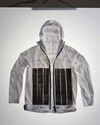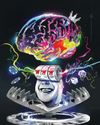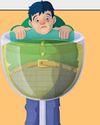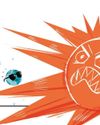
The news of King Charles's recent prostate issues and subsequent cancer diagnosis has brought the subject of prostate health problems into the public consciousness. It seems the King doesn't have prostate cancer, but he has been praised for raising awareness of the issue, especially for older men.
The charity Prostate Cancer UK has been asking men, via billboards up and down the country, to check their risk of cancer and to see their GP if there are any warning signs, such as frequent, difficult-to-control urination. Prostate cancer remains a complex and nuanced condition, however.
The prostate gland sits under the bladder and tends to get larger with age. The urethra - the tube that drains urine from the bladder to the outside world - passes through it.
This means that when the prostate enlarges, it presses on the urethra, slowing down the passage of urine and giving rise to other symptoms, such as dribbling or needing to pee more often. It's a common condition.
Similarly, the development of cancer forming in the prostate gland is also very common. In fact, autopsy studies suggest that 36 per cent of Caucasians and 51 per cent of African Americans have prostate cancer when in their 70s.
Another study even suggests that as many as five per cent of men under the age of 30 are living with prostate cancer. This sounds alarming, but the cancers were found by performing autopsies on men that died of other causes.
This story is from the March 2024 edition of BBC Science Focus.
Start your 7-day Magzter GOLD free trial to access thousands of curated premium stories, and 9,000+ magazines and newspapers.
Already a subscriber ? Sign In
This story is from the March 2024 edition of BBC Science Focus.
Start your 7-day Magzter GOLD free trial to access thousands of curated premium stories, and 9,000+ magazines and newspapers.
Already a subscriber? Sign In

NOW YOU SEE ME, NOW YOU DON'T
Scientists around the world are working on ways to hide us from sight. But how close are we to developing tech that could make us invisible?

UNCORKED POTENTIAL
How much good can ditching drink for a month really do? Answer: a whole lot. In fact, science shows even short-term abstinence could unlock a cocktail of lasting benefits

Scientists discover when humans and dogs became friends
The relationship spans thousands of years, but experts might have pinpointed the first connection

Why it's so hard to kick a gambling addiction
We now know that gambling can be as addictive as drugs, but there are factors that can make it even harder to quit

How much could Ozempic change our world?
The weight-loss drug has made headlines and broken sales records, but what does it mean for our future?

WHY DOES DRINKING ALCOHOL MAKE IT SO MUCH HARDER TO LOSE WEIGHT?
While enjoying the occasional glass of wine or pint of beer may seem harmless, regular or excessive alcohol consumption can significantly hinder your weight-loss journey for a few reasons:

Why do so many New Year's resolutions fail?
Establishing positive new habits is hard at any time of year. But there are ways to stop your attempts ending in failure

'Extreme' solar radiation storm could hit Earth
Sun-like stars may have tantrums far more frequently than we thought

HOW CAN I BANISH THE JANUARY BLUES?
Dark mornings, long chilly evenings and short days; many people find January tough.

Neutrinos are getting in the way of dark matter detection
These troublesome particles are difficult to detect, but they're starting to show up in places where they're not wanted